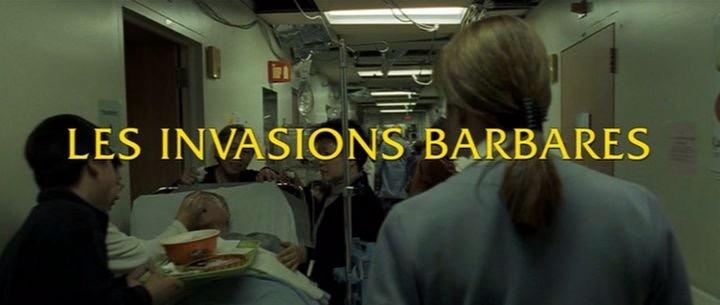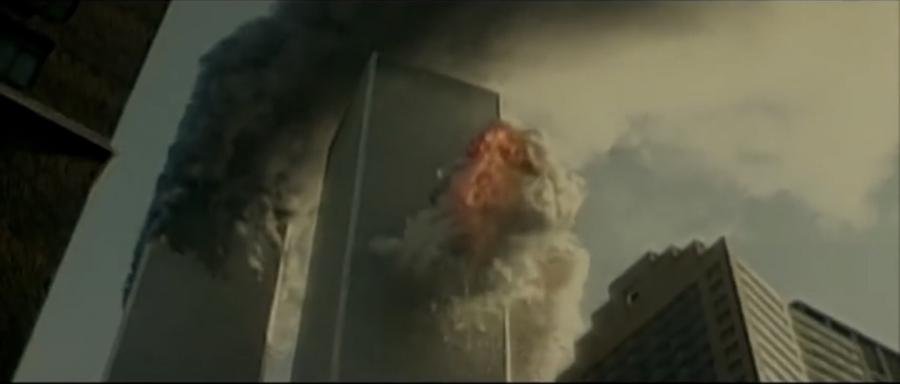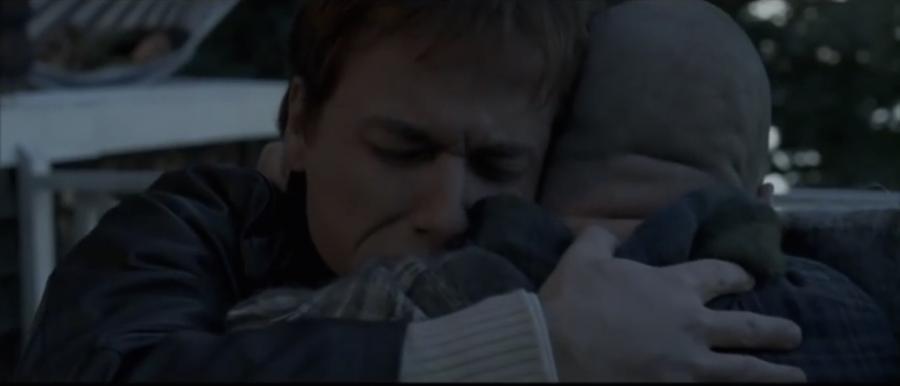Les Invasions barbares and the Fall of Rome: Old Stories and New Empires
by Tyler Sage

Denys Arcand opens Les Invasions barbares (2003)—The Barbarian Invasions—with a call back to the past. In 2001, Sébastien is summoned to his native Montreal and the sickbed of his estranged father. The two are near opposites; Sébastien, a young financial manager in a committed but fireless relationship, clashes predictably with Rémy, hedonistic, left-wing, and dying of cancer. Sébastien’s mother, nonetheless, convinces him to stay, and he sets about making his father’s last days comfortable, bribing hospital employees, buying painkilling heroin, and gathering Rémy’s old friends. This plot points towards personal reconciliation, but is also shot through with political allusions. Second in a loose trilogy, between The Decline of the American Empire (1986) and Days of Darkness (2007), the film gestures towards a grand historical narrative of decline and fall. Indeed, early on, Arcand shows United Airlines 767 plunging into the World Trade Centre on September 11th, 2001, the fall of the Twin Towers. The trauma of 9/11 is thus linked to a narrative which appeared surprisingly often after the attacks, the decline and fall of the Roman Empire, a civilization decaying from within before being, as per Arcand’s title, invaded by barbarians.
What, however, to make of this narrative’s presence in a French Canadian film which otherwise follows fraught personal relationships in a specific Quebecois socio-political moment? In investigating this disconnect, tracing the narrative through history and Arcand’s film, another pair of questions emerge. What is the film’s relation to 9/11? And what does it suggest about recurring historical narratives, such as the decline and fall of the Roman empire?
A Persistent and Politicized Story
Our story begins with the historian Edward Gibbon, influential in his use of primary sources and the literary way he wove those sources together. As Gibbon tells it in The Decline and Fall of the Roman Empire (1776-1789), internal decay—over-expansion, cultural diversity, Christianity, and waning martial spirit—left Rome vulnerable to ‹a deluge of barbarians,› who brought ‹a cloud of ignorance› and ‹subverted the laws and palaces of Rome.›1 This deluge is purely negative and, despite victory, given little credit. Rather, the decline ‹was the natural and inevitable effect of immoderate greatness.›2 Though Gibbon naturalizes his narrative here, he also argues that Rome brought about its own fall, through correctable mistakes. He asks rhetorically if ‹Europe is still threatened with a repetition of those calamities which formerly oppressed the arms and institutions of Rome,›3 directly linking the two societies as representative of civilization. Somewhat prophetically, Gibbon saw his text and the past it explains as schematics for understanding his own time. Schematic or not, his narrative remained cannon well into the twentieth century, even as various thinkers seemed to doubt or discredit it. As scholarly focus shifted to the wonders of the Byzantine Empire, however, Gibbon’s fall from progressive civilization back into barbarism was ‹rewritten as the rise of late antiquity.›4 ‹In 1995,› historian Glen Bowersock proclaims, ‹no responsible historian of the ancient or medieval world would want to address or acknowledge the fall of Rome as either fact or paradigm.›5 Yet, the paradigm persisted.
Even as historians buried the fall of Rome narrative, political thinkers unearthed it. In The Clash of Civilizations and the Remaking of World Order (1996), Samuel Huntington worries that internal moral decline, hordes of organized crime, and ‹terrorist gangs violently assaulting Civilization,› foretell a world ‹yielding to barbarism,… a global dark ages.›6 He thus endorses the ‹search for,› or propagation of, ‹common,› presumably Western, Civilizational values.7 This brand of anti-relativist rhetoric intensified after 9/11, and Morris Berman—author of Dark Ages America (2006) and Why American Failed: The Roots of Imperial Decline (2011)—is exemplary. ‹The American situation could be compared to that of Rome in the Late Empire period, and the factors involved in the process of decline in each case are pretty much the same,› Berman claims in The Guardian.8 His series of increasingly dubious comparisons culminates most tenuously in visual similarity: ‹one photograph of the shell of the World Trade Centre eerily resembles pictures of the Roman Coliseum.›9 Dubious or not, the fall of Rome remains popular in political discourse over a decade later. Harvard professor Niall Ferguson moralizes after the 2015 Paris attacks; ‹like the Roman Empire in the early fifth century, Europe has allowed its defences to crumble. As its wealth has grown, so its military prowess has shrunk, along with its self-belief. It has grown decadent in its shopping malls and sports stadiums.›10 ‹As we all know from the Roman Empire, big empires go down if the borders are not well protected,› echoed Dutch Prime Minister Mark Rutte in a bid to slow the flow of, implicitly barbaric, refugees into the EU.11 Clearly, evoking the fall of Rome, evoking the binary of civilization and barbarism, works to privilege certain groups and exclude others, but what else does it do? Why is Gibbon’s narrative so persistent?
Narrative as Schemata
Alasdair MacIntyre and Hayden White are helpful here. MacIntyre theorizes that, based on personal, cultural, and historical context, one develops ‹schemata,› to understand others’ actions and act intelligibly oneself.12 However, confronted by entirely unpredicted actions, one can become aware of these schemata and ‹recognize the possibility of systematically different possibilities of interpretation.›13 Such an ‹epistemological crisis› is resolved by narrative reformulation, through which one can ‹understand both how [one] could intelligibly have held his or her original beliefs and how [one] could have been so drastically misled by them.›14 Becoming part of a story, any crisis is smoothed over, a mere plot point. MacIntrye focuses on individual interactions, and Hayden White likewise starts psychoanalytically, but also broadens his scope, showing how in writing history, as in our personal lives, we ‹emplot› traumatic events into recognized narrative structures and thus familiarize them.15 Indeed, history is a form of fiction; ‹in both we recognize the forms by which consciousness both constitutes and colonizes the world it seeks to inhabit comfortably.›16 Thus, certain recognizable historical narratives can resurface again and again, despite their apparent disconnect from current events.

From Barbarians at the Gates to Barbarians in the Movies
On some level, The Barbarian Invasions demonstrates this. Following a fight between Sébastien and his father, the film cuts jarringly to footage of a plane crashing into the World Trade Centre. Before the image can sink in, an academic analyst takes over; ‹there were what, 3000 dead? Historically, thats insignificant… 50,000 died at the Battle of Gettysburg.›17 Immediately, the crash is framed in terms of the past. ‹What is significant, as my old prof said, is that they struck at the heart of the empire,› while previously, ‹the empire managed to keep the barbarians outside its gates, its borders.›18 Like Gibbon et al., the analyst overlays a previous narrative, the fall of the Roman Empire, to make sense of current events. Semantically, he does not just compare here, but almost conflates the two. ‹People may look back on 9/11… as the beginning of the great barbarian invasions.›19 Now, the event makes sense. The attack, this rupture or trauma, is pushed into the past, fully enveloped within historical narrative. The term 9/11 is used and one is already in the future, ‹look[ing] back› at it.20 In White’s terms, ‹the data conform[s] to an icon of comprehensible finished process.›21 Thus, as the scene continues and camera zooms out, the televised image becomes strangely peripheral. One security guard watches it idly among other screens. As Sébastien approaches, he ignores the TV, and the camera follows suite. The incident is familiarized with incredible efficiency.
A few scenes later, Rémy places the attacks in his own historical narrative of violence. Listing atrocities of the past two centuries, he concludes that ‹the history of mankind is a history of horrors,›22 echoing Walter Benjamin’s oft quoted assertion that ‹any document of civilization is a document of barbarism.›23 A socialist history professor, Rémy seems unlikely to parrot Gibbon, but perhaps this is his more nuanced version of emplotment. The narrative is less hopeful—understandable, from a cancer patient—but, for him, perhaps, it deals with the traumatic event just as efficiently as the story on TV.
Soon after, a sleazy detective explains Montreal’s drug problem to Sébastian; ‹we bust an Iranian gang, and the Iraqis take their place, or the Lebanese, Turks, Italians… It’s an invasion.›24 One cannot help but recall Gibbon; ‹the endless column of barbarians pressed on the Roman empire with accumulated weight; and, if the foremost were destroyed, the vacant space was instantly replenished by new assailants.›25 Reading the detective’s words charitably, he needs this narrative to handle the hopelessness of his profession. Like in Rémy’s and the broadcast analyst’s accounts, barbarians move within civilization, agents of decay within the gates.
Indeed, there is no shortage of barbaric references here. Roberta Imboden finds three invasions: ‹that of the suicide pilots who brought… September 11; that of drug dealers… from other countries; and that of the super-rich capitalists, such as [Sébastien].›26 Even the montage of Rémy’s friends, following the 9/11 broadcast, could imply an invasion: barbarians from the past, with loose morals. One could add the bureaucracy, corruption, and decay portrayed as endemic to the Quebecois social system. The police will not respond regarding Sébastien’s laptop, stolen by a hospital employee, and the union protects itself like a kind of mafia. Earlier shots of hospital hallways, crowded, claustrophobic, and dim, in muted grey-greens, start to suggest an entire province in decline. Yet, this sense of decline remains foggy. Even with reifying historical narratives at work, the sheer number of possibly barbaric elements makes it difficult to pin down a particular figure or concept opposing civilization within Arcand’s film.
Sébastien, in relation to Rémy and Montreal, exemplifies this difficulty. Succumbing to Arcand’s hints at historical narrative, he is ‹everything that is destroying his socialist father, just as the Goths have been seen as the destroyers of Rome.›27 This becomes problematic, however, considering that the film’s Montreal, its union thugs and rampant drugs, is also established as barbaric. As the invader embraces this corruption, an opposition between city and son does not hold up. The same is true of Sébastien and his father. Though Rémy does begin invested in their ideological opposition, it increasingly becomes a cover for more personal conflicts. Sébastien certainly resents his father’s past promiscuity more than his political beliefs. If the two men regard themselves as civilized and each other as barbaric, it may be enabled by ideological or narrative structures, but it is not fundamentally motivated by those structures. Amidst the mass of other possible barbarisms, this duo shows civilization and barbarism as relative, though the words retain their positive and negative meanings.
In a sense, this changes as father and son grow closer and the film concludes. Friends and family gathered around him, Rémy is approaching death. Ambiguously lucid, he mumbles, ‹the Middle Ages, the manuscripts… the barbarians, everywhere, tomorrow…› and as Sébastien enters, ‹their prince approaches.›28 The next morning, the two assert their love openly for the first time, and Rémy wishes Sébastien will ‹have a son as fine as [him].›29 ‹Eventually,› perhaps ‹the Goths became Romans, were ‘civilized.’ Sébastien becomes more and more part of his father’s life, becomes more and more human, and, at the end of the film… he has been changed.›30 It is ambiguous, but these scenes could also be read as the transcendence of barbarian’s negative meaning in opposition to civilization. Sébastien is labeled a barbarian but in a way linking him to his father, as a prince of tomorrow, rather than differentiating him. It is not simply a reversal but suggests a barbarian of change, renewal, and the future. This reading, however, is reinforced primarily by the pathos of the film’s conclusion, making it a little suspicious.
As the full trauma of 9/11 must be emplotted, the trauma of a cancer patient surrounded by fraught family relationships and decaying social systems, to operate as a meaningful narrative, must end this way. Boiled down, the story could read: father was womanizer; father gets cancer; father and son disdain each other; son buys his way through corrupt society; son enables father’s addicted to heroin and friend’s relapse; father dies; son nearly cheats on fiancée but does not. For characters and viewers, the reconciliation is necessary. In a way though, this required redemptive ending eclipses the problematics of historical narratives, civilization, and barbarism exposed throughout. As some reactions to 9/11 and some models of world politics, it seems oversimplified. French Canadian critic, Jean Larose, betrays this uneasiness; ‹if Rémy had passed away alone, still on bad terms with his boy, then we would have had a real tragedy… in accordance with the present situation [in Quebec] where numerous parents end up abandoned by the children.›31 In short, ‹this movie curiously combines nihilism and sentimentalism.›32 What then, to draw from this curious combination?
Two Conclusions
What does the film reveal about recurring historical narratives? With MacIntyre and White in mind, The Barbarian Invasions emphasizes the constructed nature of these narratives and their insufficiency when overlaid upon contemporary events. Arcand presents no unified correspondence to the story his title implies. Instead, three different attempts to utilize that narrative are treated with degrees of irony. The detective uses the invasion he maligns as an excuse to blackmail public figures who buy drugs. The analyst—comical hair, tableau of books, citing his old history professor—is a caricature, woefully distant from the events he emplots. Even Rémy admits the futility of past schemata: ‹separatists… existentialists… Marxists… Maoists… structuralists… Deconstructionists. Is there an ‘ism’ we haven’t worshipped?›33 When Rémy calls Sébastien a barbarian, for the first and only time, it is as if all Arcand’s allusions have finally added up, but also feels arbitrary. The looseness of these allusions, like allusions to Rome in response to crisis, is what allows this. In off-hand, half-ironic gestures towards narratives of barbarian invasion and the decline and fall of the Roman Empire, the film acknowledges their ease of use and insufficiency at once. It is above all distanced from these narratives.
How does the film relate to 9/11? The Barbarian Invasions addresses September 11th neither directly nor allegorically. In the same sidelong way which it questions recurring historical narratives, it questions the centrality of 9/11 as ‹an event of surpassing disproportion.›34 Arcand represents the attacks but allows his characters and audience to largely ignore them. Similarly, Quebec is a part of North America but in many ways peripheral or unique in its position, identifying with colonial France as much as Canada; it is several degrees separated from the U.S, though only hours in the air from New York. Emplotting such grandly American events in such an offhand way, Arcand denies not only the universality of recurring narratives, but universal notions of centre and periphery. Conspicuously lacking location establishing shots, it refuses to privilege even Montreal. Here too, the film is aloof, but what does all this distance accomplish?

And a Complication
Again, everything hinges on how one reads Sébastien. If he is a positive barbarian, it is vaguely in the sense of Deleuze and Guattari’s nomad figure, as ‹nomads have no points, paths, or lands, even though they do by all appearances.›35 They operate fluidly in ‹smooth› space rather than regulated, ‹striated,› space.36 Consider chess and Go as analogy. ‹Chess is a game of the state› where ‹pieces are coded; they have an internal nature and intrinsic properties from which their movements, situations, and confrontations derive.›37 Instead, Go pieces wage ‹war without battle lines, with neither confrontation nor retreat.›38 They have ‹no intrinsic properties, only situational ones.›39 Nomads, one could say, only play Go, see all space as smooth. Sébastien, similarly, moves through situations unconcerned with legality or borders. He closes a deal between a Norwegian oil company and a London bank while crossing between the US and Canada. He buys heroin beside a narcotics officer. Creating a new hospital room for his father, he navigates the field of play in a way which opens up space undefined by it. For Deleuze and Guattari this is all potentially positive insofar as it offers an alternative to hegemony.
Yet, Sébastien’s nomadic characteristics stem from capitalist ones. ‹Money is no problem.›40 Bundling Sébastien, capitalism, and barbarism together seems problematic, as the financial manager’s alignment with other figures of barbarism and in-film labelling as a barbarian remain imprecise. However, following Deleuze and Guattari, this is exactly the point; the nomad ignores binaries, totalizing narratives, and firm borders. Another pair of philosophers clarify chillingly here: ‹the ideology of the world market has always been the anti-foundational and anti-essentialist discourse par excellence.›41 Capital and commodities themselves break down borders and binaries in their desire to flow freely. In Empire (2000), Hardt and Negri explain this to problematize typical postmodern critiques—as made by Deleuze and Guattari or even Arcand’s film—of power structures. Power, they argue, no longer resides in enlightenment ideals. Instead, it has ‹evacuated the bastion… and has circled around to the rear to join [postmodernists and postcolonialists] in the assault in the name of difference.›42 It is this situation, unintuitively but vividly, which Denys Arcand seems to capture.

Thus, the distance The Barbarian Invasions keeps from historical narrative structures and from 9/11 as an insurmountable trauma destabilizes both, clearing them away to reveal the smooth space through which capital, incarnate in Sébastien, flows in aid of neoliberal Empire. The character is a positive, progressive barbarian only insofar as he has no concern for that label. At the end of the film, Roberta Imboden sees a Goth who, as his plane takes off for London, ‹looks out the window in a manner that suggests he has been changed,›43 but as Sébastien looks out the window, it is his fiancée who demonstrates real change. In the film’s final words, and for the first time, Gaëlle says, ‹I love you.›44 Sébastien is silent.
Tyler Sage
Originally from Western Canada, Tyler Sage is currently completing his Research Master’s in Literary Studies at Leiden University. His research interests center around contemporary film, fiction, and digital media, their interplay and political potential. Tyler can be reached at [email protected].
- 1. William Gibbon: ‹General Observations on the Fall of the Roman Empire in The West›, http://www.ccel.org/g/gibbon/decline/volume1/chap39.htm, 27 May 2015. par. 12.
- 2. Ibid., par. 2.
- 3. Ibid., par. 5.
- 4. Glen W. Bowersock: ‹The Vanishing Paradigm of the Fall of Rome›, 1996, 42.
- 5. Ibid.
- 6. Samuel Huntington: ‹The Clash of Civilizations and the Remaking of World Order›, 1996, 321.
- 7. Ibid., 318.
- 8. Morris Berman: ‹Waiting for the Barbarians›, http://www.theguardian.com/books/2001/oct/06/books.guardianreview5, 27 May 2015, par. 2.
- 9. Ibid., par. 8.
- 10. Niall Fergson: ‹Paris and the Fall of Rome›, https://www.bostonglobe.com/opinion/2015/11/16/paris-and-fall-rome/ErlRj…, 20 Mar. 2016, par. 7.
- 11. Mike Bird: ‹A European Prime Minister is Talking Seriously about the EU Collapsing like the Roman Empire›, http://www.businessinsider.com.au/mark-rutte-interview-on-migrant-crisis…, 20 Mar. 2016, par. 4.
- 12. Alasdair MacIntyre: ‹Epistemological Crises, Dramatic Narrative and the Philosophy of Science›, 1977, 453.
- 13. Ibid., 454.
- 14. Ibid., 455.
- 15. Hayden White: ‹Tropics of Discourse: Essays in Cultural Criticism›, 1978, 84.
- 16. Ibid., 99.
- 17. Denys Arcand: ‹Les Invasions Barbares›, 2003.
- 18. Ibid.
- 19. Ibid.
- 20. Ibid.
- 21. White, 86.
- 22. Arcand.
- 23. Walter Benjamin: Illuminations, 1968, 259.
- 24. Arcand.
- 25. Gibbon, par. 6.
- 26. Roberta Imboden: ‹The Barbarian Invasions (Les Invasions barbares)›, 2005, 50.
- 27. Ibid.
- 28. Arcand.
- 29. Ibid.
- 30. Imboden, 50.
- 31. Jean Larose: ‹The Interview - The Boomer, and Death›, http://www.ledevoir.com/culture/cinema/28460/l-entrevue-le-boomer-et-la-…, 26 May 2015, par. 6.
- 32. Ibid., par. 4.
- 33. Arcand.
- 34. Thomas H. Kean et al: ‹The 9/11 Commission Report›, http://avalon.law.yale.edu/sept11/911Report.pdf, 29 May 2015, 233.
- 35. Gilles Deleuze and Félix Guattari: ‹A Thousand Plateaus: Capitalism and Schizophrenia›, 1987, 381.
- 36. Ibid., 361.
- 37. Ibid., 352.
- 38. Ibid., 353.
- 39. Ibid.
- 40. Arcand.
- 41. Michael Hardt and Antonio Negri: ‹Empire›, 200, 150.
- 42. Ibid., 138.
- 43. Imboden, 50.
- 44. Arcand.
 you've got barbarians
you've got barbarians 